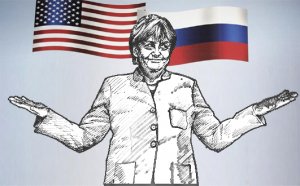
Andrew Korybko
Andrew Korybko is the American Master’s Degree student at the Moscow State University of International Relations (MGIMO)
The EU and Russia have begun speaking about the concept of democratic security, an idea which means absolutely different things to each side.
At the most recent meeting of the Council of Europe, Russian Foreign Minister Sergei Lavrov and Secretary General Thorbjorn Jagland discussed the need for democratic security, with Russia emphasizing that this is especially relevant for Macedonia at the moment. While no further public comments were released on the matter, it’s clear that Brussels and Moscow have two completely different conceptualizations of this idea in mind. As can be seen by the case of Macedonia, the EU viewspragmatic, independently minded leaders as ‘threats’ to the unipolar (supposedly ‘democratic’) world order, but Russia sees Color Revolutions and externally plotted coups against national leaders as constituting the true danger to democracy.
Same Word, Different Worlds Of Meaning
Let’s take a look at how the EU and Russia differ in their implicit understanding of democratic security:
Definition:
EU
Judging by Brussels’ behavior towards Macedonia, it can be surmised that it understands ‘democratic security’ as being the retention of personal pawns and Western-dependent countries. In the EU’s understanding, Bulgaria under obedient Prime Minister Boyko Borissov is ‘democratically secure’, whereas Macedonia under pragmatically assertive Prime Minister Nikola Gruevski is ‘democratically insecure’. It’s also no coincidence that Borissov is embraced for stonewalling South Stream but Gruevski is shunned for supporting Balkan Stream.
Russia
Moscow feels differently, of course. It holds the view that the West shouldn’t consider multipolar and independent leaders as threats to democracy (either domestically or internationally), and that the polls are the only acceptable ‘regime change’ option for a country. Thus in Russia’s view, democratic security is about safeguarding the administration of elected leaders. Accordingly, Gruevski is lauded for his democratic credentials and anti-Color Revolution stance, but post-Color Revolution Ukrainian leader Aleksander Turchinov was decried as being anti-democratic.
Focus:
EU
Democratic motions such as regular voting and subjectively defined ‘free media’ are important to Europe, and if a party or candidate emphasizes their commitment to ‘Euro-Atlantic values’, then it does wonders for their ‘democratic’ credentials. This all changes, however, if they don’t agree to walk in lockstep with Brussels’ foreign policy (as ‘official’ Euro-Atlantic aspirant Macedonia has refused to do), which then apparently invalidates all previously acknowledged democratic progress.
Russia
Europe judges democracy based on its surface presentation, but Russia looks at the actual substance involved. Key to its assessment is whether the leader in question was elected and represents the general mood, sentiment, and interests of the country. Gruevski undoubtedly satisfied these requirements by rallying nearly 100,000 people to the streets of Skopje to defend against the anti-democratic aggression being waged against Macedonia, while the Color Revolutionaries could only procure a fraction of that.
Cause For Concern:
EU
The Europeans become alarmed whenever a strong, determined, and pragmatic leader (a.k.a. not a technocrat) is elected and engages in multipolar policies and independent rhetoric. As it stands, Gruevski fits these characteristics more fully than any other European leader today, ergo the Color Revolution attempt.
Russia
Russia raises extreme concern whenever a radical political minority (particularly one that’s outside-supported) tries to (violently) overthrow a democratically elected and legitimate government, as iscurrently underway in Macedonia right now.
Solution:
EU
When faced with what it views to be a ‘democratic security crisis’, the EU (as guided by its American supervisors) assists with a Color Revolution and/or public shaming attempts in an effort to lasso the wayward leaders and the countries they represent back into the unipolar corral. This explains why some European politicians (notably Bulgaria’s Sergey Stanishev) publicly threw their weight behind Sunday’s destabilization inauguration, since they clearly felt compelled to interfere in Macedonia’s domestic affairs in order to ‘correct’ its ‘wayward’ geopolitical tract.
Russia
Russia’s response to democratic security threats against its partners is to engage in supportive information campaigns that aid them in exposing the intelligence-guided regime change plot. Strategic guidance, political cooperation, and diplomatic support are also ways that Russia helps defend democracies that are under attack.
The Conundrum
The insurmountable obstacle between these two views of democratic security is Brussels and its American partner’s response to strong, determined, and pragmatic leaders. Instead of waiting for democracy to run its course, they actively try to sabotage the system by staging a Color Revolution. The most ironic thing about this whole dichotomy is that the West partakes in anti-democratic measures ostensibly to ‘protect democracy’, yet it accuses Russia of ‘supporting despots’ whenever Moscow voices support for legitimate governments like Syria’s, for example. The core of the contradiction between the EU and Russia can actually be traced down to the emergence of independent leaders in the first place, as this is what upsets the West to the point that they try to deploy a Color Revolution against the targeted government.
First things first, such individuals are elected by their people in free, fair, and internationally recognized elections, meaning that it’s the people themselves who are responsible for placing their leaders into power. It may possibly be the case that the Prime Minister or President in question hadn’t focused much on foreign policy during the electoral season, thereby signifying that they reached a certain understanding of international affairs (or publicly began expressing their existing standpoint) only after they entered office, but even in this case, the country’s leader is still the legitimate representative of his country’s interests abroad.
Saving The Multipolar Choice
The very fact that foreign leaders have the choice to pursue unipolar or multipolar policies is because of these 5 very important characteristics of the post-Cold War order:
* Russian nuclear parity with the US and Putin’s Great Power revival of the country enabled it to retain its position as a solid military counterweight to the unipolar world.
* The US helped build up China in order to counter the USSR, but eventually, Beijing became ‘uncontrollable’ and now has a sense of destiny in rising as an independent global actor.
* The popularly recognized period of unipolarity stretching from 1991 until at most 2013 (when the US backtracked from conventionally attacking Syria amid Russian counter-pressure) brought with it a slew of military mistakes (Yugoslavia, Afghanistan, Iraq, Libya, etc.) that discredited the Western foreign policy model and made the global audience more receptive to the multipolar alternative.
* The shift of economic gravity from the West to the Asia-Pacific changed the global focal point from the solidly unipolar world to the frontier of multipolarity.
* Democratic double standards in preaching about ‘human rights’ and ‘democracy’ but buddying up with the Gulf Kingdoms (some of the most anti-democratic and least humane states in the world) dealt irreparable soft power damage to the Western message and planted fruitful seeds of unipolar suspicion in the global consciousness.
Concluding Thoughts
Democratic security is the most important emerging strategic field in the world today, as it forms the crucible of conflict between the unipolar and multipolar camps. Unipolar states and their proxies will continually seek to overthrow disobedient or independent leaders, while the multipolar world does what it reasonably can to support the people’s choice of government. At the end of the day, however, democratic security comes down to the targeted people’s will to resist the regime change attempt being thrust upon them, and as Italian journalist and Balkan specialist Umberto Pascali remarked, Macedonia’s resistance may signify a strategic Stalingrad in the fight against Color Revolutions worldwide.






_jpg/250px-ElbeDay1945_(NARA_ww2-121).jpg)









